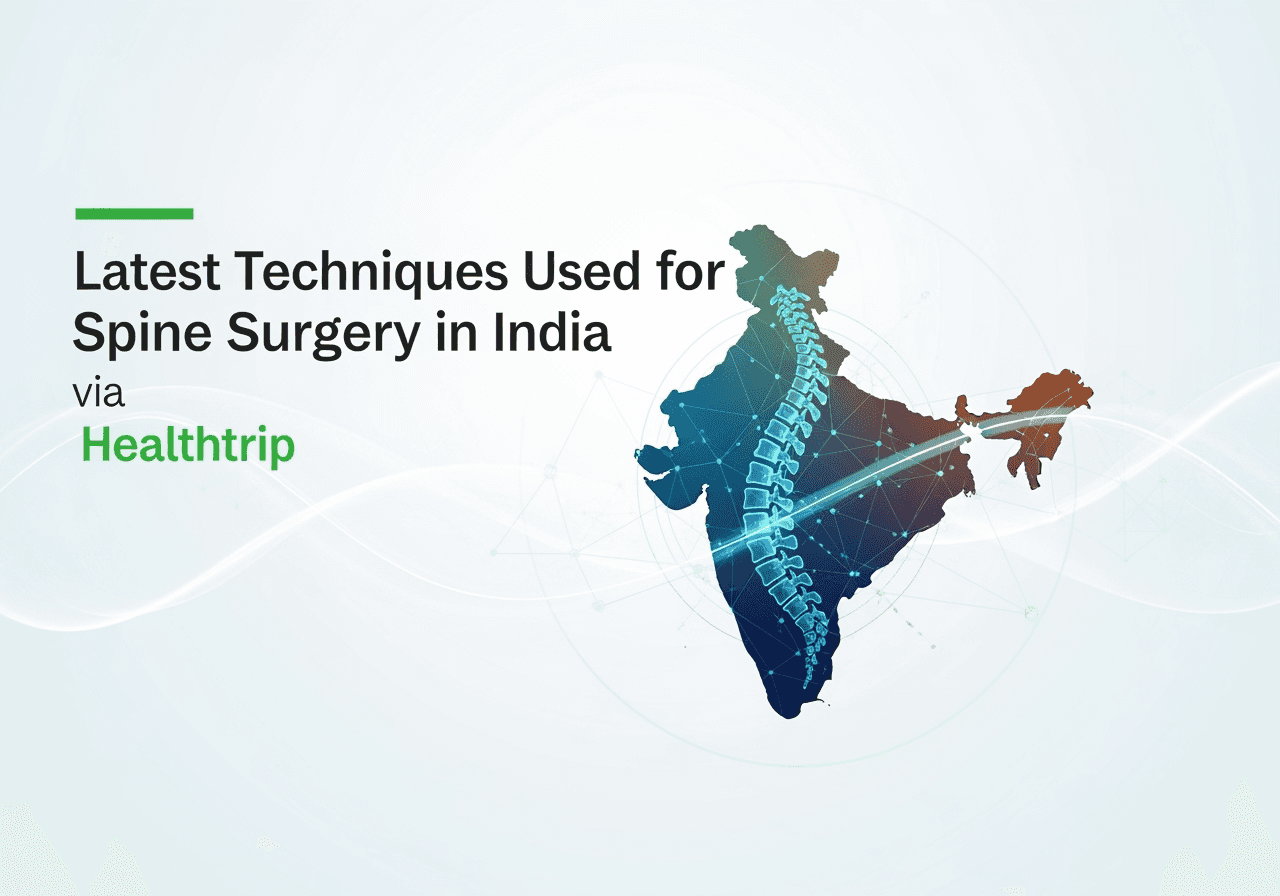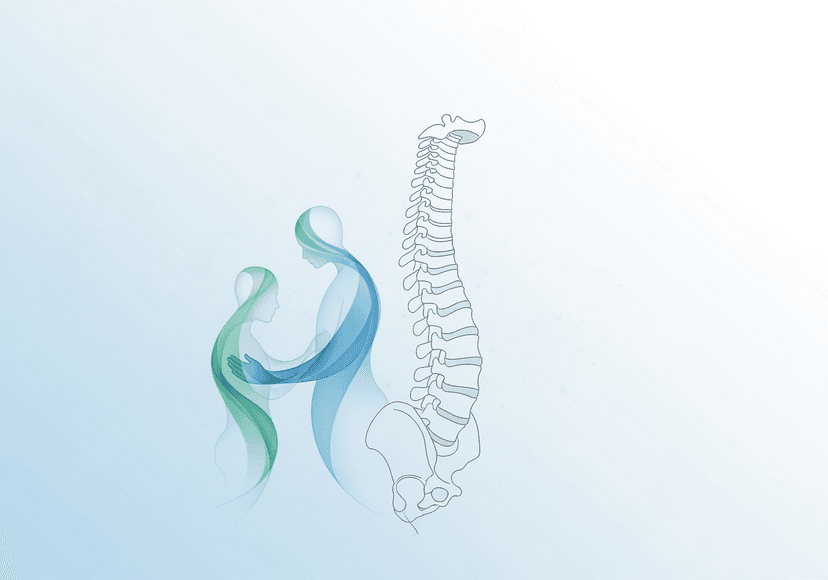
Latest Techniques Used for Spine Surgery in India via Healthtrip
14 Oct, 2025
 Healthtrip
Healthtrip- Minimally Invasive Spine Surgery (MISS): A Revolution in Spine Care in India
- Robotic-Assisted Spine Surgery: Precision and Accuracy Redefined at Fortis Memorial Research Institute, Gurgaon
- Navigation-Guided Spine Surgery: Enhanced Safety and Outcomes at Max Healthcare Saket
- Motion-Preserving Techniques: Alternatives to Spinal Fusion < li>Vertebral Compression Fracture Treatments: Kyphoplasty and Vertebroplasty at Fortis Hospital, Noida
- Disc Replacement Surgery: Restoring Spinal Functionality < li>Conclusion: The Future of Spine Surgery in India
Minimally Invasive Spine Surgery (MISS)
Minimally Invasive Spine Surgery (MISS) has revolutionized the field, offering patients a less traumatic alternative to traditional open procedures. MISS techniques involve smaller incisions, specialized instruments, and advanced imaging to access and treat spinal conditions. This approach minimizes muscle damage, reduces blood loss, and leads to faster recovery times. Patients often experience less post-operative pain and shorter hospital stays, allowing them to return to their daily activities sooner. At Fortis Hospital, Noida and Max Healthcare Saket, surgeons are skilled in performing MISS procedures for various conditions, including herniated discs, spinal stenosis, and vertebral fractures. Healthtrip facilitates access to these leading hospitals, ensuring patients benefit from the expertise of experienced surgeons and the latest MISS technologies. This alignment with advanced medical practices underscores Healthtrip's commitment to providing superior healthcare solutions, making complex procedures more accessible and less daunting for those seeking relief from spinal ailments. Embracing MISS reflects a patient-centric approach, prioritizing comfort and quicker rehabilitation.
Most popular procedures in India
Robotic-Assisted Spine Surgery
Robotic-assisted spine surgery represents a significant leap in precision and accuracy. Utilizing robotic platforms, surgeons can perform complex procedures with enhanced visualization and control. The robot's precise movements translate the surgeon's commands, minimizing the risk of errors and improving surgical outcomes. This technology is particularly beneficial in spinal fusions, scoliosis correction, and tumor resections, where accuracy is paramount. The use of robotic assistance leads to smaller incisions, reduced tissue trauma, and improved implant placement. Hospitals like Fortis Memorial Research Institute, Gurgaon are at the forefront of adopting robotic-assisted spine surgery, and Healthtrip connects patients with these advanced facilities. Healthtrip's commitment to providing access to cutting-edge medical technologies ensures that patients receive the best possible care. The integration of robotics in spine surgery exemplifies a commitment to innovation, aiming to enhance surgical precision, minimize complications, and ultimately improve the quality of life for patients suffering from spinal disorders. Patients can feel confident knowing they are benefiting from state-of-the-art technologies.
Advanced Spinal Fusion Techniques
Spinal fusion aims to stabilize the spine by joining two or more vertebrae together. Modern spinal fusion techniques have evolved to enhance fusion rates and reduce complications. Techniques like interbody fusion, which involves placing bone grafts between the vertebral bodies, have shown excellent results. The use of bone morphogenetic proteins (BMPs) can stimulate bone growth and accelerate the fusion process. Moreover, advanced instrumentation, such as pedicle screws and rods, provides strong fixation and stability. Fortis Shalimar Bagh and Max Healthcare Saket are renowned for their expertise in performing advanced spinal fusion procedures. Healthtrip ensures that patients are informed about these innovative techniques and have access to the best surgeons specializing in spinal fusion. These advancements in spinal fusion highlight a focus on optimizing patient outcomes, reducing recovery times, and improving long-term spinal stability. By facilitating access to these specialized treatments, Healthtrip is dedicated to ensuring that patients receive the most effective and personalized spinal care available.
Wellness Treatments
Give yourself the time to relax
Lowest Prices Guaranteed!

Lowest Prices Guaranteed!
Disc Replacement Surgery
Disc replacement surgery offers an alternative to spinal fusion for patients with degenerative disc disease. Instead of fusing the vertebrae, a damaged disc is replaced with an artificial one, preserving spinal motion and flexibility. This motion-preserving approach can reduce the risk of adjacent segment degeneration, a common complication after spinal fusion. Disc replacement surgery is particularly suitable for patients with single-level disc disease and no significant spinal instability. Leading spine surgeons at hospitals like Fortis Hospital, Noida are proficient in performing disc replacement procedures. Healthtrip assists patients in identifying the right specialists and facilities for disc replacement surgery, ensuring they receive comprehensive evaluations and personalized treatment plans. This alternative to spinal fusion provides patients with a chance to maintain a more natural range of motion, enhancing their overall quality of life. Healthtrip's commitment to connecting patients with innovative treatment options underscores its dedication to providing comprehensive and patient-centered healthcare solutions.
Minimally Invasive Spine Surgery (MISS): A Revolution in Spine Care in India
Imagine a world where spine surgery doesn't mean weeks of recovery and significant pain. That world is increasingly becoming a reality thanks to Minimally Invasive Spine Surgery (MISS). It's transforming how spine conditions are treated in India, offering a gentler, more efficient approach to restoring spinal health. Think of it as keyhole surgery for your back – instead of large incisions, surgeons use small cuts, often just a few millimeters long. Through these tiny openings, they insert specialized instruments, guided by real-time imaging, to address the problem area. This translates to less muscle damage, reduced blood loss, and a significantly lower risk of infection. The benefits extend far beyond the operating room. Patients typically experience less post-operative pain, shorter hospital stays, and a faster return to their daily activities. This is a game-changer for those struggling with chronic back pain, sciatica, or other debilitating spinal conditions. At Healthtrip, we understand the importance of getting you back on your feet as quickly and comfortably as possible, and MISS plays a crucial role in achieving that goal.
The beauty of MISS lies in its precision. Surgeons can target the affected area with greater accuracy, minimizing disruption to surrounding tissues. This can be particularly beneficial for conditions like herniated discs, spinal stenosis, and vertebral fractures. For example, during a microdiscectomy, a common MISS procedure for herniated discs, the surgeon removes only the portion of the disc that's pressing on the nerve, relieving pain and restoring function. The traditional open surgery approach, on the other hand, often involves removing a larger portion of the disc, potentially leading to instability and the need for future fusion surgery. MISS techniques are constantly evolving, with new instruments and approaches being developed to address a wider range of spinal conditions. This ongoing innovation is driving further improvements in patient outcomes and solidifying MISS as the gold standard for many spine procedures. Healthtrip is committed to connecting you with leading hospitals and surgeons in India who are at the forefront of this revolution in spine care, ensuring you receive the most advanced and effective treatment available. Consider Fortis Shalimar Bagh as it offers advanced spine care
Robotic-Assisted Spine Surgery: Precision and Accuracy Redefined at Fortis Memorial Research Institute, Gurgaon
Robots aren't just for science fiction anymore; they're revolutionizing spine surgery. At Fortis Memorial Research Institute in Gurgaon, robotic-assisted spine surgery is taking precision and accuracy to a whole new level. Imagine a surgeon, not just with human hands, but with the enhanced capabilities of a robotic system. This isn't about replacing the surgeon; it's about empowering them with tools that allow for greater dexterity, visualization, and control. The robotic arm acts as an extension of the surgeon's hands, allowing them to perform complex maneuvers with millimeter-level accuracy. This is particularly crucial in delicate procedures like spinal fusion, where precise placement of screws and implants is essential for long-term stability and pain relief. Consider the challenges of navigating the complex anatomy of the spine, avoiding sensitive nerves and blood vessels. The robotic system provides a three-dimensional view of the surgical field, allowing the surgeon to visualize these structures with unprecedented clarity. This reduces the risk of complications and improves the overall safety of the procedure.
Another significant advantage of robotic-assisted spine surgery is its ability to minimize errors. The robotic system uses pre-operative imaging to create a detailed surgical plan, guiding the surgeon's movements during the procedure. This reduces the reliance on freehand techniques, which can be prone to human error. The result is a more consistent and predictable outcome, with a lower risk of revision surgery. While the thought of a robot performing surgery might seem daunting, it's important to remember that the surgeon is always in control. The robotic system simply enhances their abilities, allowing them to perform the procedure with greater precision and safety. For Healthtrip clients seeking the most advanced and minimally invasive spine surgery options, Fortis Memorial Research Institute in Gurgaon stands out as a leader in robotic-assisted techniques. The technology ensures enhanced precision and shorter recovery times, aligning with Healthtrip's commitment to providing access to world-class healthcare. It also allows for smaller incisions, less blood loss, and reduced risk of infection, leading to a faster recovery.
Navigation-Guided Spine Surgery: Enhanced Safety and Outcomes at Max Healthcare Saket
Think of navigation-guided spine surgery as having a GPS for your spine. At Max Healthcare Saket, this technology is enhancing the safety and improving the outcomes of complex spinal procedures. Just like a GPS guides you to your destination, navigation systems provide surgeons with real-time feedback on the position of their instruments within the patient's body. This is particularly useful when placing screws, implants, or performing decompression procedures in areas close to critical nerves and blood vessels. Pre-operative imaging, such as CT scans or MRIs, is used to create a three-dimensional map of the patient's spine. This map is then uploaded into the navigation system, allowing the surgeon to track the exact location of their instruments as they operate. The system provides visual and auditory cues, alerting the surgeon if they are approaching a critical structure. This added layer of precision can significantly reduce the risk of complications, such as nerve damage or misplaced implants. Max Healthcare Saket is adept in this technology
One of the key benefits of navigation-guided spine surgery is its ability to minimize radiation exposure. Traditional spine surgery often relies on X-ray imaging during the procedure to guide instrument placement. Navigation systems, on the other hand, can reduce or even eliminate the need for X-rays, protecting both the patient and the surgical team from harmful radiation. Furthermore, navigation-guided surgery can lead to improved accuracy and efficiency. The real-time feedback allows surgeons to place implants with greater precision, reducing the likelihood of revision surgery. The technology also streamlines the surgical workflow, potentially shortening the duration of the procedure. Healthtrip recognizes the importance of safety and precision in spine surgery, and that’s why we partner with leading hospitals like Max Healthcare Saket that offer navigation-guided techniques. We strive to connect you with experts who use cutting-edge technology to ensure the best possible outcomes. This advanced approach contributes to faster recovery times, reduced pain, and ultimately, a better quality of life.
Also Read:
Motion-Preserving Techniques: Alternatives to Spinal Fusion
Spinal fusion, the traditional gold standard for treating various spinal conditions, involves joining two or more vertebrae together to eliminate motion between them. While effective for pain relief and stabilization, fusion can limit spinal flexibility and potentially lead to adjacent segment degeneration – a domino effect where the fused segment places extra stress on neighboring vertebrae. Thankfully, motion-preserving techniques offer a glimmer of hope, presenting viable alternatives aimed at maintaining the spine's natural movement and preventing those long-term complications. These innovative approaches are becoming increasingly popular, especially for younger, more active patients who want to maintain their lifestyle without sacrificing spinal health. Imagine being able to bend, twist, and move freely without the stiffness and limitations that often accompany spinal fusion. This is the promise of motion preservation, and it's a game-changer for many seeking lasting relief from back pain.
One such technique involves artificial disc replacement, where a damaged disc is replaced with a prosthetic device designed to mimic the natural disc's cushioning and motion. Another option is dynamic stabilization, which utilizes flexible rods and screws to stabilize the spine while still allowing a controlled range of motion. These techniques are not suitable for everyone; careful patient selection is crucial. Factors such as the specific spinal condition, the extent of degeneration, and the patient's overall health all play a role in determining whether a motion-preserving approach is appropriate. A thorough evaluation by a qualified spine surgeon is essential to weigh the pros and cons and determine the best course of action. Healthtrip can help connect you with experienced spine specialists at leading hospitals worldwide, such as Vejthani Hospital in Bangkok, known for their expertise in advanced spinal treatments. Exploring these options could mean the difference between a life limited by stiffness and one filled with movement and vitality.
Also Read:
Vertebral Compression Fracture Treatments: Kyphoplasty and Vertebroplasty at Fortis Hospital, Noida
Vertebral compression fractures (VCFs), often caused by osteoporosis, can be incredibly painful and debilitating. These fractures occur when the vertebrae in the spine collapse, leading to back pain, limited mobility, and even a hunched posture. While conservative treatments like pain medication and bracing can provide some relief, kyphoplasty and vertebroplasty offer minimally invasive solutions to stabilize the fractured vertebrae and alleviate pain. These procedures are like precision repair jobs for your spine, restoring height to the collapsed vertebrae and providing immediate pain relief. Imagine being able to stand tall again, without the constant ache and stiffness that VCFs can cause. This is the promise of kyphoplasty and vertebroplasty, and they're bringing much-needed relief to countless individuals suffering from these fractures.
Kyphoplasty involves inserting a balloon into the fractured vertebra to create space and restore its original height before injecting bone cement to stabilize it. Vertebroplasty, on the other hand, involves directly injecting bone cement into the fractured vertebra without prior balloon inflation. Both procedures are performed under image guidance, ensuring accurate cement placement and minimizing the risk of complications. Fortis Hospital, Noida, is recognized for its expertise in performing these procedures, offering patients access to experienced spine specialists and advanced imaging technology. The choice between kyphoplasty and vertebroplasty depends on the specific fracture pattern and the surgeon's preference. Both procedures are generally safe and effective, providing significant pain relief and improved quality of life for patients with VCFs. Healthtrip can assist you in scheduling a consultation with a spine specialist at Fortis Hospital, Noida, or other leading hospitals in India, to determine if kyphoplasty or vertebroplasty is the right treatment option for you. Consider it an investment in your long-term spinal health and well-being.
Disc Replacement Surgery: Restoring Spinal Functionality
When a spinal disc becomes severely damaged or degenerated, it can cause chronic back pain, radiating leg pain (sciatica), and limited mobility. While conservative treatments like physical therapy and pain medication may provide temporary relief, disc replacement surgery offers a more definitive solution by replacing the damaged disc with an artificial one. This innovative procedure aims to restore spinal functionality, alleviate pain, and improve the patient's overall quality of life. Unlike spinal fusion, which eliminates motion at the affected segment, disc replacement preserves movement, reducing the risk of adjacent segment degeneration. Imagine regaining your ability to bend, twist, and move freely without the constant pain and stiffness that a damaged disc can cause. Disc replacement surgery offers this potential, making it a life-changing option for many who have exhausted other treatment options.
The artificial disc is designed to mimic the natural disc's shock-absorbing and load-bearing capabilities, allowing for a more natural range of motion. Disc replacement surgery is typically considered for patients with single-level disc degeneration who have not responded to conservative treatments. It's crucial to undergo a thorough evaluation by a qualified spine surgeon to determine if you're a suitable candidate for this procedure. Factors such as the extent of disc degeneration, the presence of other spinal conditions, and your overall health will all be taken into consideration. Healthtrip can connect you with experienced spine surgeons at renowned hospitals around the world, such as Memorial Bahçelievler Hospital in Istanbul, known for their expertise in disc replacement surgery. Embarking on this journey requires careful consideration and expert guidance, and Healthtrip is here to provide you with the resources and support you need to make informed decisions about your spinal health.
Conclusion: The Future of Spine Surgery in India
India is rapidly emerging as a global hub for advanced spine surgery, offering patients access to cutting-edge technologies, experienced surgeons, and world-class facilities at competitive prices. From minimally invasive techniques to robotic-assisted procedures, Indian hospitals are at the forefront of innovation in spine care. As technology continues to advance, we can expect even more sophisticated and personalized approaches to spine surgery, leading to improved outcomes and faster recovery times. The future of spine surgery in India is bright, with the potential to transform the lives of countless individuals suffering from spinal disorders. Consider Fortis Memorial Research Institute, Gurgaon or Max Healthcare Saket as prime examples.
Healthtrip is committed to connecting patients with the best spine surgeons and hospitals in India, providing comprehensive support and guidance throughout their medical journey. Whether you're seeking minimally invasive surgery, robotic-assisted procedures, or motion-preserving techniques, Healthtrip can help you find the right treatment option and the right medical team to meet your individual needs. With a focus on quality, affordability, and patient satisfaction, India is poised to become the destination of choice for spine surgery patients from around the world. The journey to a pain-free and mobile life is within reach, and Healthtrip is here to help you take that first step.
Related Blogs

Latest Techniques Used for Neuro Surgery in India via Healthtrip
Detailed guide on neuro surgery, featuring doctors, hospitals, risks, recovery,

Healthtrip's Process for Booking Your Neuro Surgery in India
Detailed guide on neuro surgery, featuring doctors, hospitals, risks, recovery,

Best Doctors for Neuro Surgery in Top Healthtrip Hospitals
Detailed guide on neuro surgery, featuring doctors, hospitals, risks, recovery,

How Healthtrip Ensures Quality & Safety in Spine Surgery Procedures
Detailed guide on spine surgery, featuring doctors, hospitals, risks, recovery,

End-to-End Logistics for Spine Surgery with Healthtrip's Support
Detailed guide on spine surgery, featuring doctors, hospitals, risks, recovery,

Healthtrip's Care Coordinators: Your Support During Spine Surgery
Detailed guide on spine surgery, featuring doctors, hospitals, risks, recovery,










